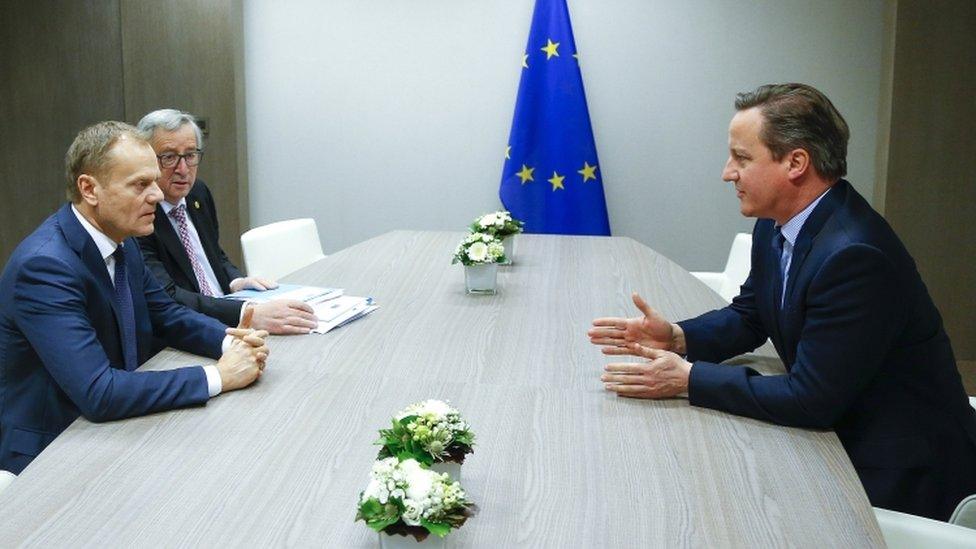Staying in EU 'exposes UK to terror risk', says Iain Duncan Smith
- Published
Iain Duncan Smith: "The lack of any control on our borders is a critical issue"
Staying in the EU will make the UK more vulnerable to Paris-style terrorist attacks, Work and Pensions Secretary Iain Duncan Smith has told the BBC.
Mr Duncan Smith, who is campaigning for an EU exit, also questioned the effectiveness of curbs to migrants' benefits on immigration to the UK.
The senior minister's comments directly contradict David Cameron, who says the UK is "safer and stronger" in the EU.
The PM told the BBC that leaving the EU would be "a leap in the dark".
Appearing on the BBC's Andrew Marr Show, he also warned that leaving would give the UK an "illusion of sovereignty" but not full control.
And Mr Cameron appealed to senior Conservative MP and London mayor Boris Johnson, who is expected to announce later that he will vote to leave the EU, to back the campaign to stay.
David Cameron: "You have an illusion of sovereignty but you don't have power"
His pitch came as Tory London mayoral candidate Zac Goldsmith said he would campaign for exit in the 23 June referendum.
Meanwhile, UKIP leader Nigel Farage said a vote to leave would mean the UK was "in charge of our own country".

Analysis, by BBC political editor Laura Kuenssberg
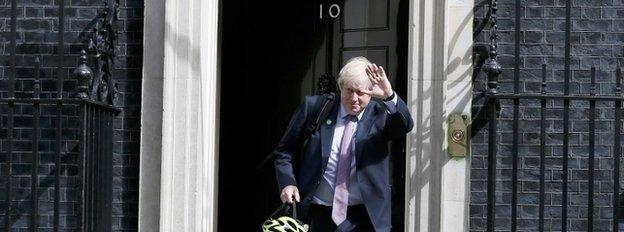
This is the new, if temporary reality: cabinet ministers disagreeing totally with each other on the record, and in public. Traditionally unthinkable, certainly risky, and difficult to control.
Plenty of disagreements are spilling out into the public domain now. But while Boris Johnson keeps his counsel, not for very much longer, there is of course huge speculation not just about what he is going to do, but about what his motivations are.

Speaking to BBC political editor Laura Kuenssberg, Mr Duncan Smith said that being a member of the EU "leaves the door open" to attacks such as those in Paris last year.
He suggested migrants arriving in the EU could eventually end up in the UK without proper consideration of their motivations.
"This open border does not allow us to check and control people that may come and spend time," he said.
"We've seen what happened in Paris where they spent ages planning and plotting so who's to say it's not beyond the wit of man that those might already be thinking about that."
Asked directly whether he believed EU membership made the UK more vulnerable to Paris-style attacks, he replied: "I think the present status of the open border we have right now many of us feel does actually leave that door open and we need to see that resolved."
'Point blank refusal'
Mr Duncan Smith also questioned whether proposals for an "emergency brake" on migrants' benefits - part of the deal negotiated by Mr Cameron - would do much to curb the number of people coming to the UK.
Benefit payments were a "small" pull factor but control of the UK's borders was more significant and a "glaring area" that needed addressing.
He noted that the initial plan was for an emergency brake on migration but the EU "point blank refused to even discuss it".
Nigel Farage: "If we vote to leave the EU we will be in charge of our own country"
Earlier, on the BBC's Andrew Marr Show, Mr Cameron defended his renegotiation of Britain's terms of EU membership, reached after two days of intense wrangling with EU leaders in Brussels this week.
He said he had secured reforms "people said weren't achievable", including curbs to migrants' benefits and exempting Britain from "ever closer union".
The offer on the table was a "better" deal for the UK and would be "legally binding", he said.
'Safety in numbers'
Making his case for why Britain should stay in a "reformed" EU, Mr Cameron said it would safeguard the UK position in the single market and help in the fight against terrorism and crime.
"Safety in numbers in a dangerous world," he said.
Proponents of Britain leaving the EU have argued it would give Britain back control of itself.
But Mr Cameron warned: "If we leave the EU that might give you a feeling of sovereignty - but is it real?
"Would you have power to help businesses not be discriminated against in Europe? No, you wouldn't. Would you have the power to insist European countries share with us their border information so we know what terrorists and criminals are doing in Europe? No, you wouldn't.
"So you have an illusion of sovereignty but you don't have power, don't have control, you can't get things done."
He said he would be bringing forward proposals "in the coming days" to underpin the power of the UK Parliament.
Nicola Sturgeon: A Leave result would "almost certainly" trigger demands for another independence vote
Mr Cameron also appealed to Mr Johnson not to join six ministers who attend cabinet in campaigning to leave the EU.
"I'd say to Boris as I say to everyone else - we will be safer, stronger, better off inside the EU.
"I think the prospect of linking arms with Nigel Farage and George Galloway and taking a leap into the dark is the wrong step for our country.
"And if Boris and others really care about getting things done in our world, the EU is one of the ways in which we get things done," he said.
'Ridden over roughshod'
Also on the Marr Show, Mr Farage criticised the scope of the PM's reform deal, and said it could be vetoed by the European Parliament and the European Court of Justice.
"There is one absolute certainty if we vote to leave... and that is that we will be in charge of our own country, we will make our own laws, we will run our own ministerial departments," he said.
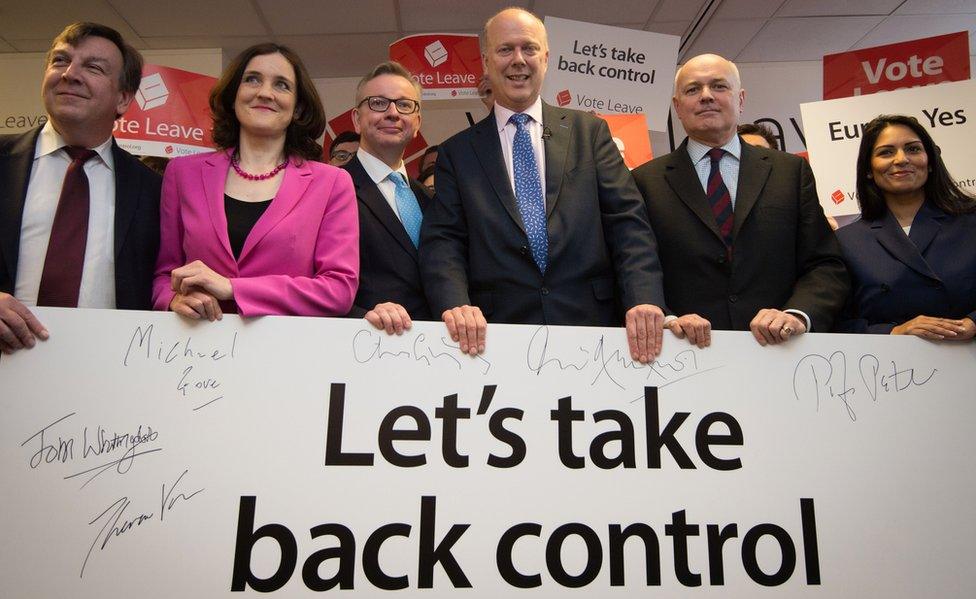
John Whittingdale, Theresa Villiers, Michael Gove, Chris Grayling, Iain Duncan Smith and Priti Patel (from left) have backed the leave campaign
Employment minister Priti Patel, who is campaigning for an EU exit, told the BBC's Pienaar's Politics that the referendum was a chance for the UK to "take back control".
By remaining a member of the EU, key decisions made in the UK risked "being ridden over roughshod" by EU institutions, she said.
Scottish First Minister Nicola Sturgeon warned that if the UK voted to leave the EU but Scotland did not, it would "almost certainly" trigger demands for another referendum on Scottish independence.
Meanwhile, Hilary Benn, Labour's shadow foreign secretary, told the BBC's Sunday Politics that EU membership was "good for jobs, investment and growth".
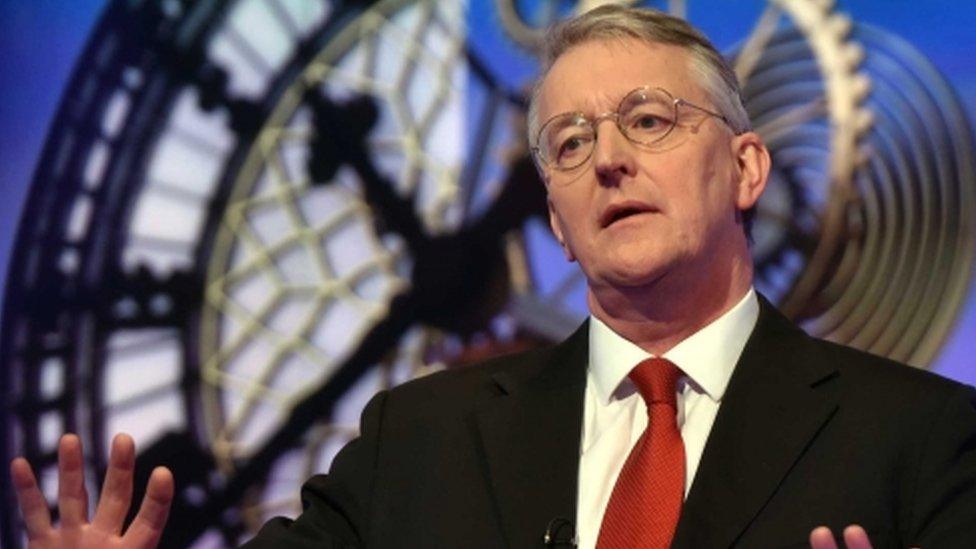
Mr Benn said the UK was "safer" being in the EU
He said "the whole Labour movement" would be campaigning to stay in, but he ruled out sharing a platform with Mr Cameron.
"We make our own arguments in our way to try and win the case and the prime minister can do the same in his way with his party and the people that he is seeking to persuade," he said.
'Mired in the past'
Splits in the cabinet over the referendum have been laid bare by interviews and articles in Sunday's newspapers.
Writing in the Observer, external, Foreign Secretary Phillip Hammond said "leaving the EU would be a threat to our economic security and our national security".
In an article for the Mail on Sunday, external, Business Secretary Sajid Javid said he would be voting for the UK to remain in the EU with a "heavy heart" and no "enthusiasm". He said leaving the EU could add to "economic turbulence".
However, Justice Secretary Michael Gove - a close friend and ally of Mr Cameron - wrote in the Sunday Telegraph, external that the EU was "mired in the past". He said choosing to join the leave campaign had been "the most difficult decision of my political life".
Northern Ireland Secretary Theresa Villiers told the BBC leaving the EU was a safer option than staying in it.
She said there had been a sense of history at the cabinet meeting to discuss the vote - the first to be called on a Saturday since the Falklands War.
Former Home Secretary Alan Johnson, who is leading Labour's campaign to stay in the EU, said people should not be distracted by Conservative divisions over Europe, saying the referendum was about "much more important issues".
Referring to the cabinet members who are campaigning for an EU exit, he said "they're not the six most astute politicians that I've ever met in the cabinet".
Labour, the SNP, Plaid Cymru and the Lib Dems have said they are in favour of staying in the EU. The DUP said it will recommend voting to leave the bloc.

Read more
- Published22 February 2016
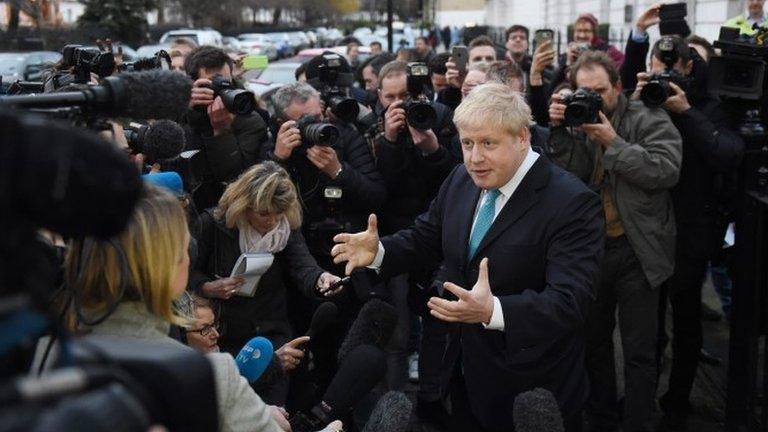
- Published21 February 2016
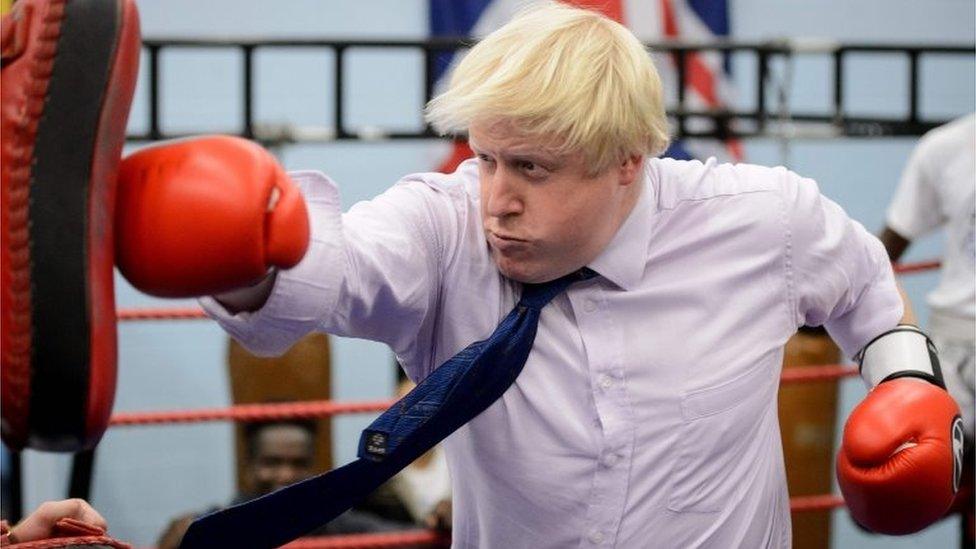
- Published18 February 2016
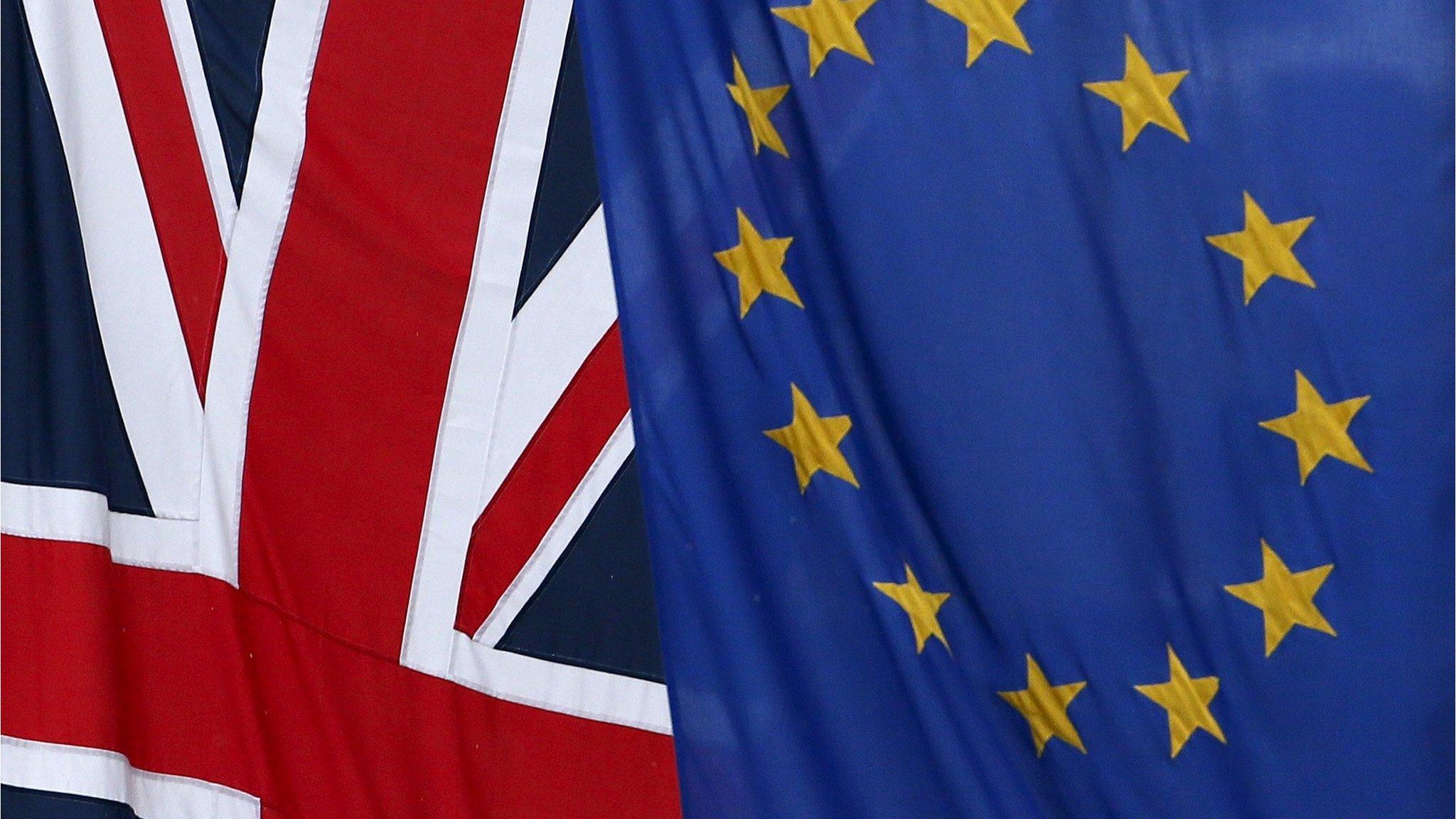
- Published20 February 2016
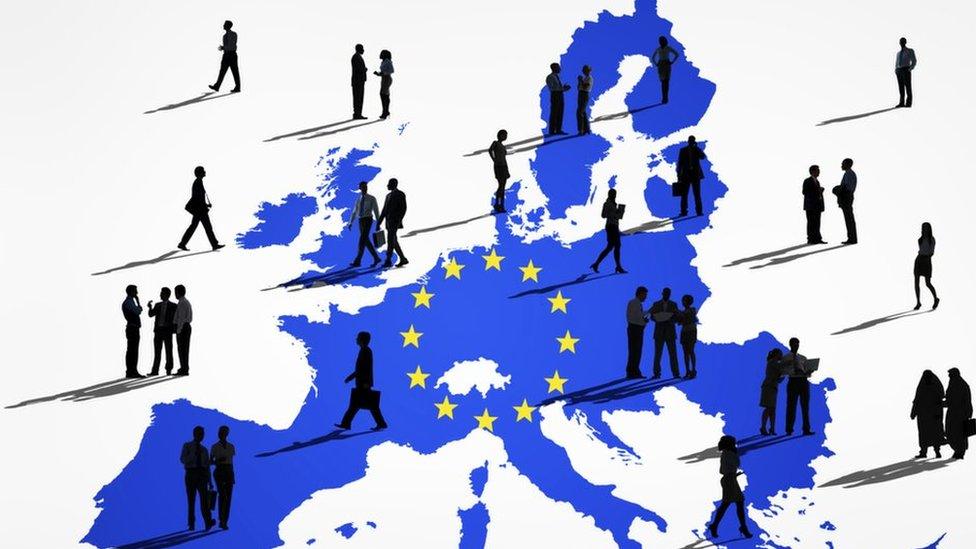
- Published22 June 2016
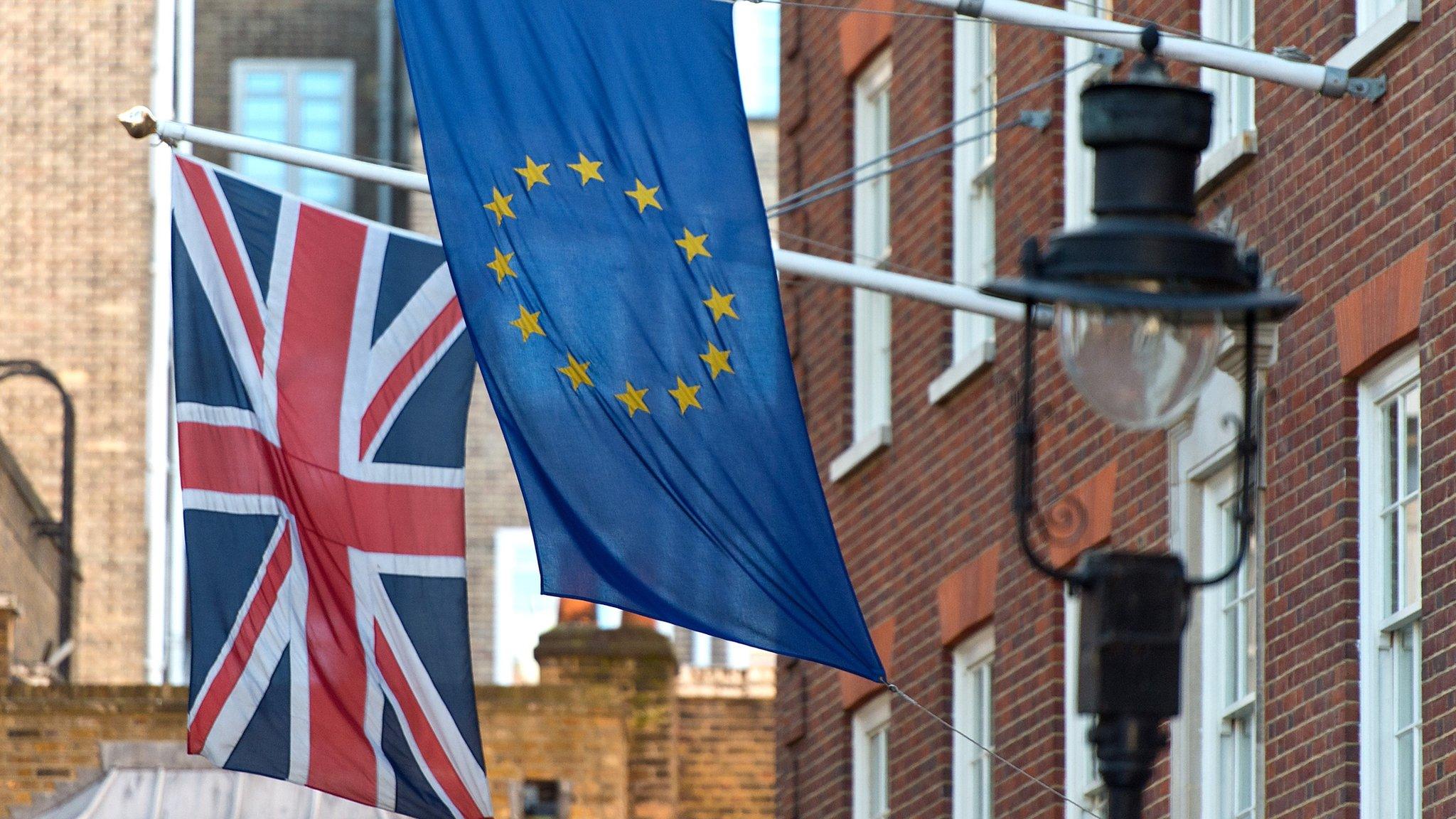
- Published30 December 2020

- Published21 February 2016
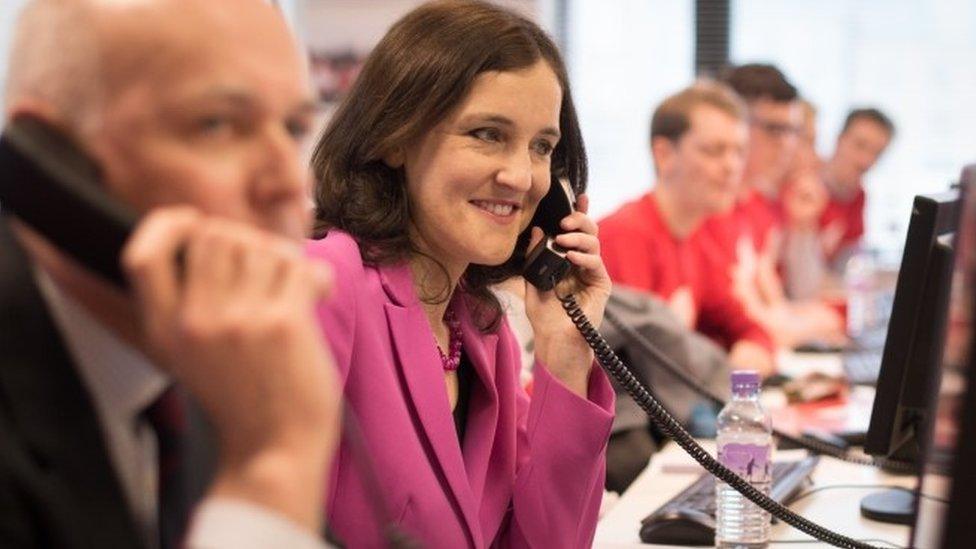
- Published20 February 2016
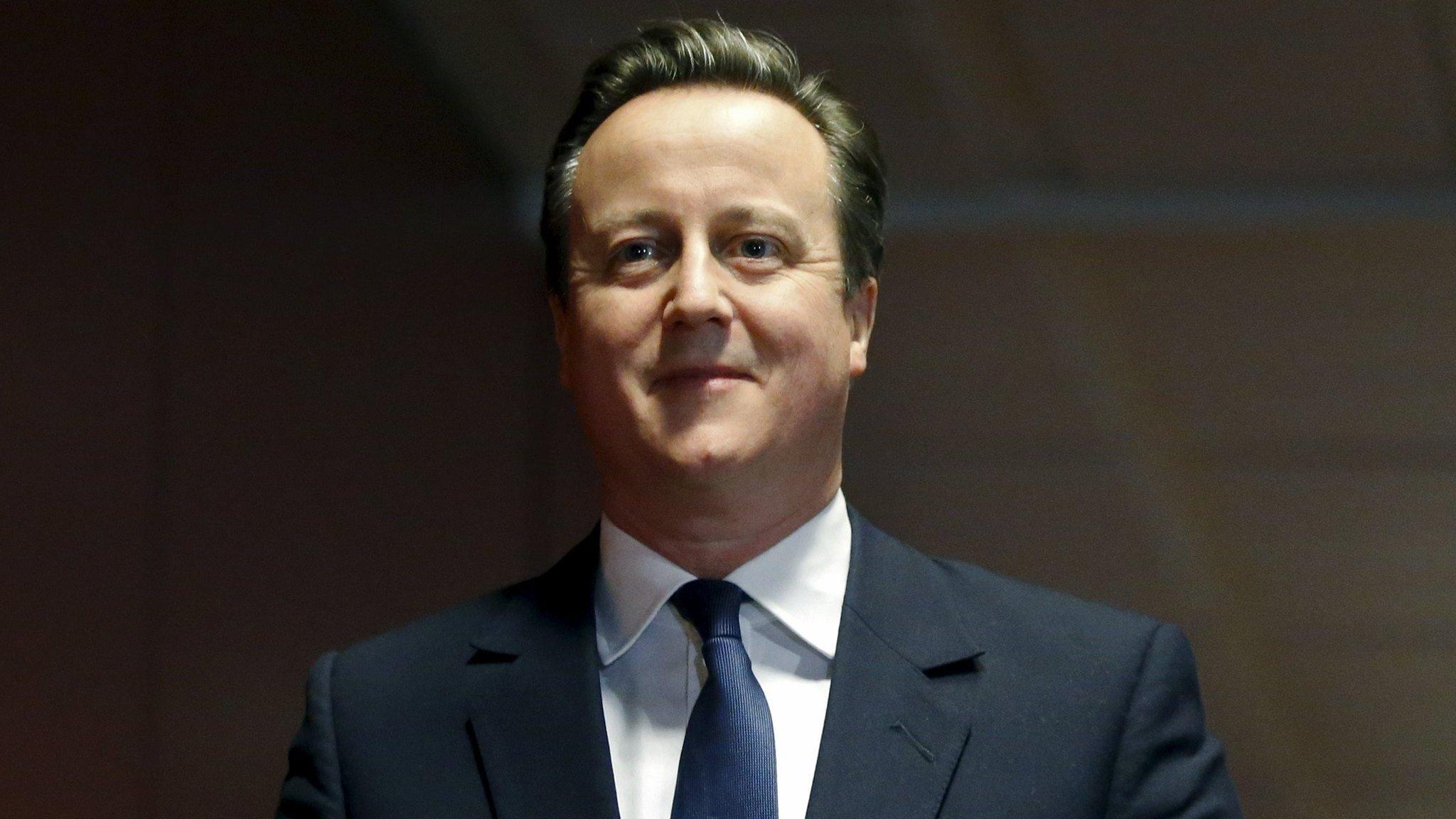
- Published21 February 2016
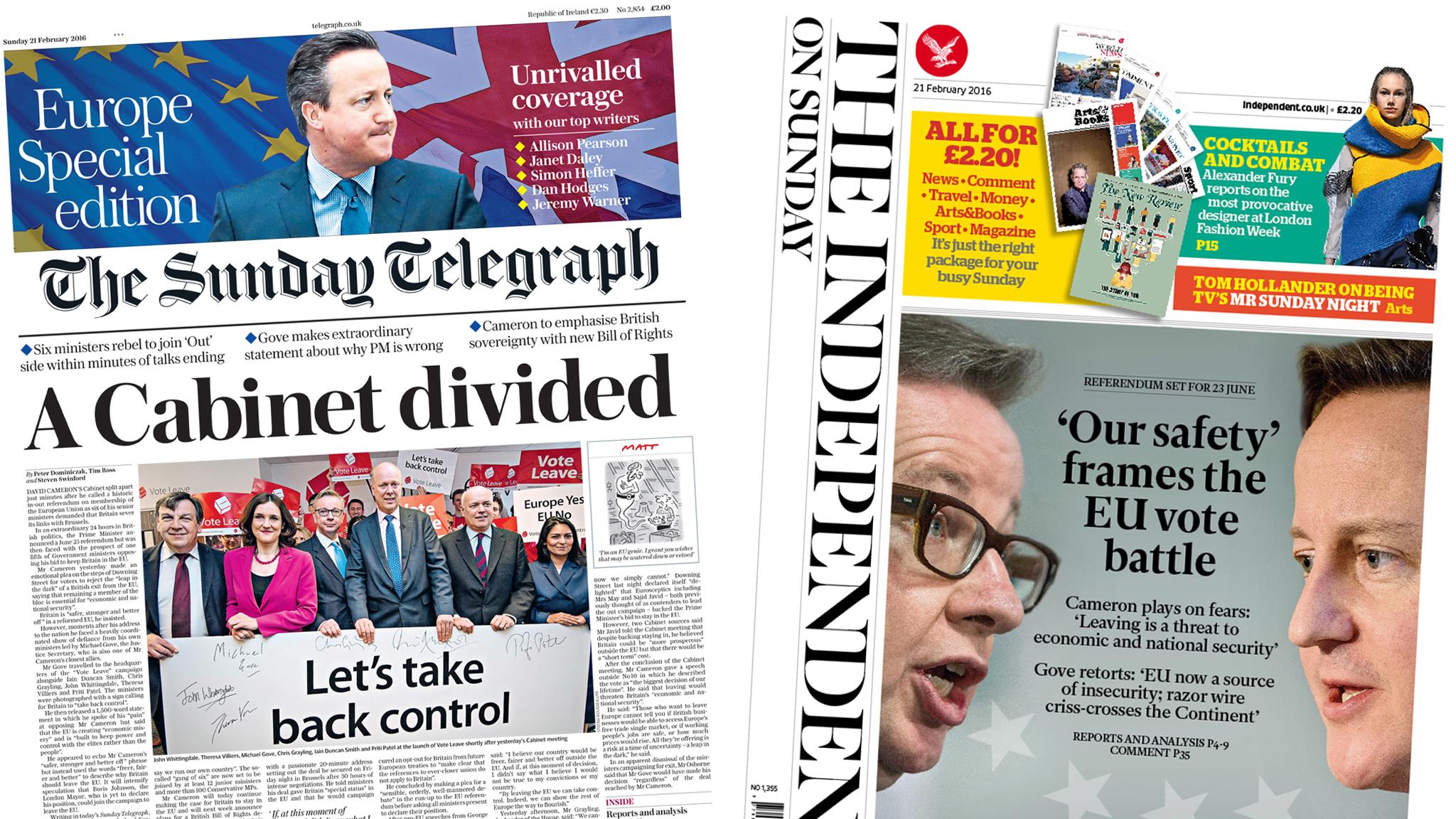
- Published20 February 2016
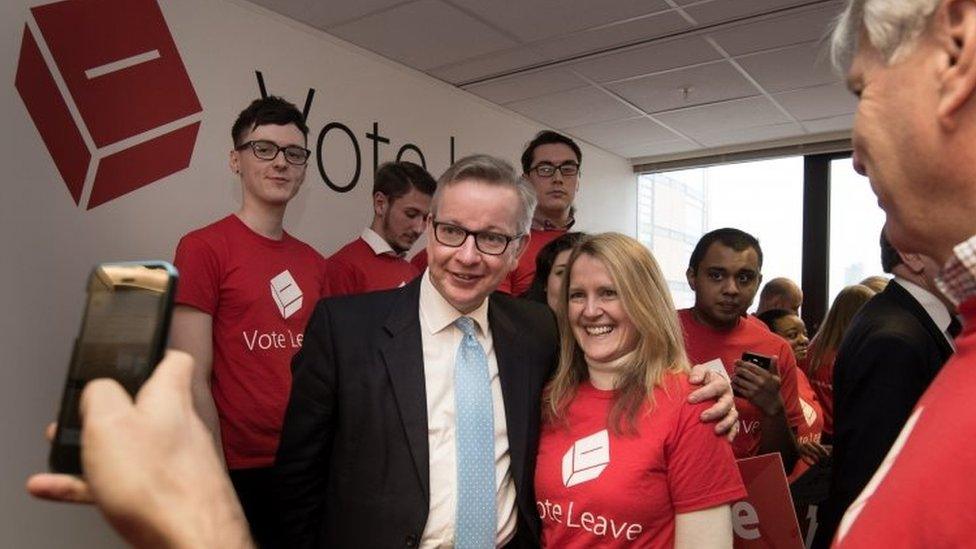
- Published20 February 2016
- Published20 February 2016
- Published21 February 2016
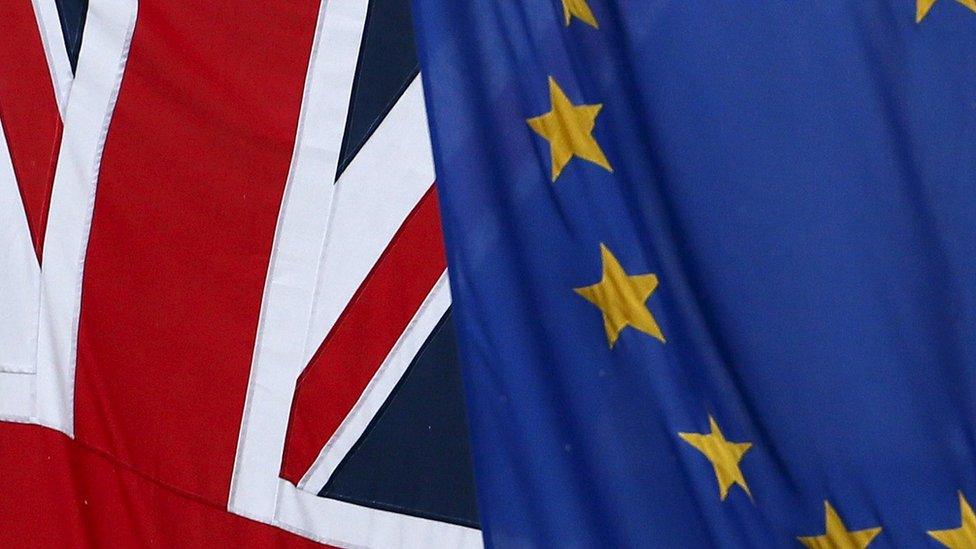
- Published20 February 2016
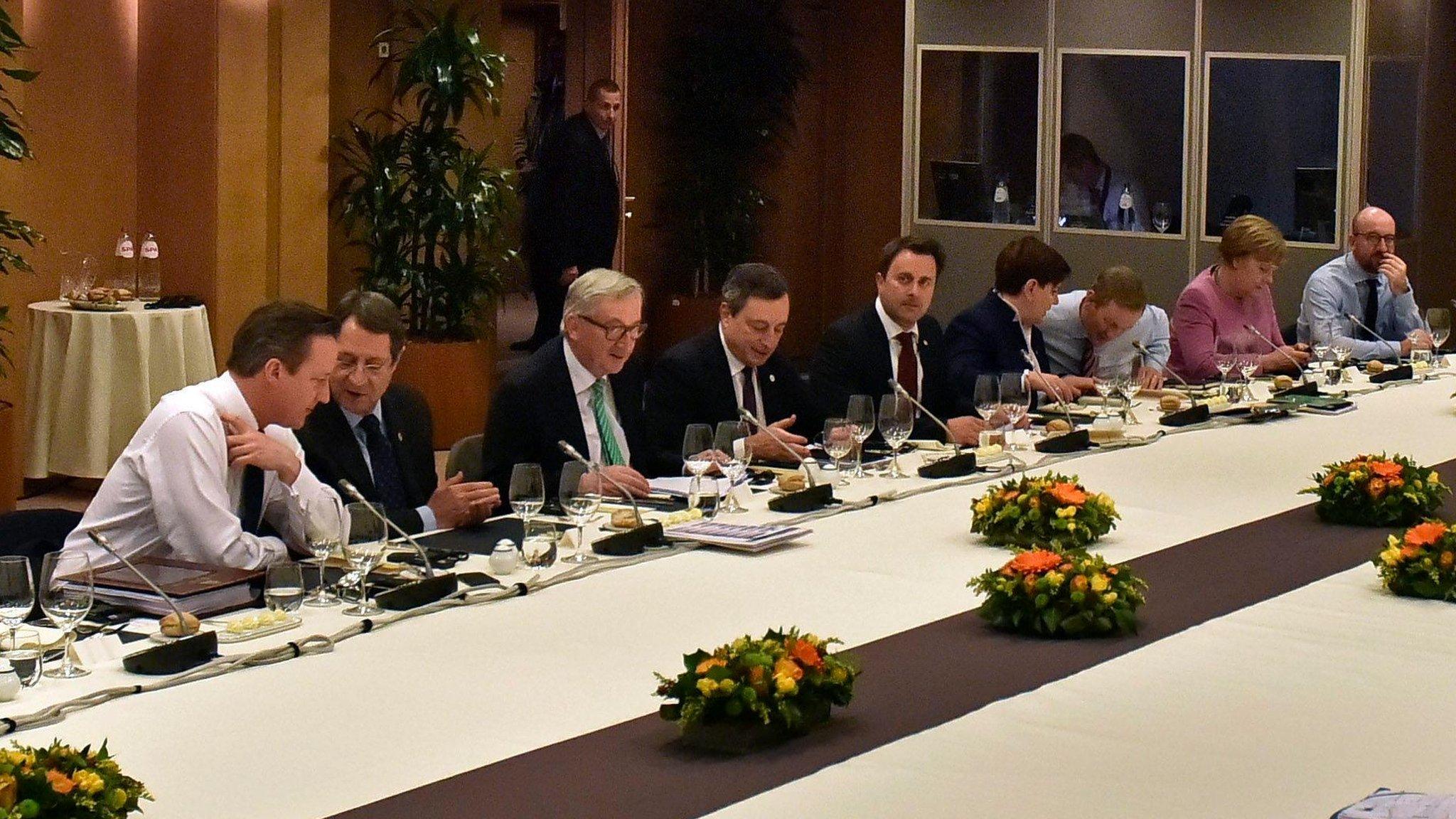
- Published20 February 2016
